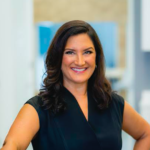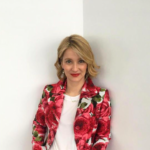Elizabeth Kiefer is an entertainment writer at Refinery29. Her writing has been published in publications including Marie Claire and Self. She has fantastic advice for freelancers, writers, and all young professional women. We met after I took her class at General Assembly. I learned so much in two hours, and knew I had to share more of her advice!

You are a writer, editor, senior content strategist, and teacher. How did you discover your love of writing and content strategy?
I’ve been an obsessive reader my entire life, and I majored in journalism; writing has always been the clearest way I have of expressing myself. Content strategy sort of just happened, but it was a happy accident. The skills that I build as a digital editor and content producer found a home under that title. I had the right tools at the right time.
You’ve written for some of my favorite publications like Teen Vogue, Refinery29, Marie Claire, and BUST Magazine, and you were previously a freelance online features editor at Teen Vogue. What advice do you have for people who hope to become a freelance writer?
My advice for becoming a freelance writer is to network like crazy in a non-obnoxious way—stay in touch with people, build clips, attend industry events, and stay active in your own writing—and simply make yourself as available as possible. As an editor, my pet peeve is when people say they want to write but don’t come prepared with ideas, or they have really limited availability. Being able to meet needs and understand what’s right for a particular publication is really key.
What is your best advice for pitching publications?
Your best bet is to know someone or know someone who knows someone and establish a solid, consistent rapport. And don’t undervalue involvement in the writing community—getting to know other writers is really important, because they may have connections to the places you want to pitch and can be helpful.
How did you grow your successful freelance business?
I mostly work through direct referrals. By building solid relationships with one brand or agency and getting to know the staff, it’s easy to reach out when an opportunity for something else crops up and have an “in.” I’m also pretty diligent about keeping my professional pages, like LinkedIn, up to speed; I receive a lot of opportunities from recruiters or directly from brands looking for someone who can provide a specific service that way.
What general tips do you have for someone who wants to take their skills — like content strategy, writing, and editing — and become a freelancer?
Develop a retainer income; you can’t be good at the thing you love when you’re stressed out about paying your rent and scrimping every month doesn’t count as success in the long term. That retainer could be a really solid client you do copywriting for; it could be an agency where you work part-time; it could be bartending on Saturday nights. But having a revenue stream that’s separate from the thing you’re trying to build your career around is sometimes the thing that allows you to do cool work for less money and build your portfolio.
What is your favorite topic to write about?
I’m really passionate about women’s rights issues and breaking down gender misunderstandings and divides. Anything on that beat is something I want to write about—but I’m also happy to do health and celeb stuff.
What is the piece that you’re most proud of?
Toughie! I recently wrote a piece for Marie Claire about not looking in a mirror for a week—it was pretty cathartic, so I think I’ll go with that one for now.
How did your career path lead you to what you do now?
I’ve always been a writer and an editor. For the last couple of years, I’ve worked mainly in a freelance capacity, which allowed me to figure out what I really wanted. Recently I rejoined the Refinery29 staff as a full-time freelance entertainment writer after realizing that I was getting a little burned out on being the maestro; I wanted to go back to just playing in the band.
What is one thing that you wish you had known when you were starting out your career?
That people are the most important thing; that the money matters less than what you’ll learn in the process (and you can get by on very little); that you don’t have to prove anything to anyone; and that opportunities arise in the most unexpected places.
What advice would you give to someone who is in the first five years of their career?
Chill out. Enjoy yourself. Save half of your income (especially if it’s freelance—you are going to get taxed on that eventually). Say yes most of the time, but say no when it’s something you have a gut instinct isn’t good for you. Don’t be afraid to pack up and relocate. And try not to get too good at anything you don’t like doing.
What is on your desk right now?
I’m lucky enough to have a home office, so my desk is a little multi-functional. But in general, I always have a couple of pads of paper, a pen, my calendar, a glass of water, and a cup of coffee. I also can’t work write without wearing my headphones, but I usually don’t have them plugged into anything—it’s more of a mental thing.
Where do you turn for inspiration?
Every morning, I spend a fair amount of time combing through the internet, looking for story ideas. I’m often inspired by that, but the best ideas always seem to come when I’m talking with girlfriends or other writerly buds; the stuff that’s top of mind for them usually sparks a creative idea on my end (thanks guys!).
Who is your mentor?
Eep! Tough. I have a lot of mentors in the different areas of my life, but my content creation co-pilot is Drake Baer, a lifelong friend and the editor of the Ideas section at Business Insider. Whenever I’m trying to shape something—an idea, a sentence—he’s the person I call.
What is the best advice you’ve ever received?
Learn how you work best. Once you tap into that and understand your own rhythms, what’s important and necessary in order for you to feel like your needs are being met, that you’re feeling respected, and of course, productive, it’s a lot easier to actually get shit done—and still have a life.
What advice do you have for other young professional women?
Change is good: Embrace it and go for the flow—but set definitive goals for yourself, and fight for the thing you want. Also: Negotiate your salary. Always. You owe it to yourself, and to women everywhere.

































3 Responses to Career Profile: Elizabeth Kiefer, Refinery29